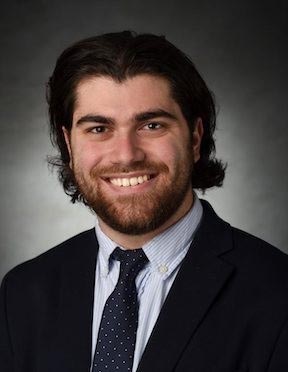Acoustics graduate student receives National Science Foundation fellowship
4/7/2020
By Tessa M. Woodring
UNIVERSITY PARK, Pa. — Eric Rokni, a doctoral candidate in the Penn State College of Engineering’s Graduate Program in Acoustics, was recently awarded the 2020 National Science Foundation Graduate Research Fellowship to support his research in acoustics for a three-year period.
The NSF Graduate Research Fellowship Program (GRFP) provides financial support to graduate students in the science, technology, engineering and mathematics (STEM) disciplines who are conducting research at institutions across the United States. According to the NSF GRFP website, recipients of this fellowship are among an elite group of successful individuals that includes Sergey Brin, co-founder of Google; Steven Chu, former U.S. Secretary of Energy and Nobel Laureate in Physics; and Amy Mainzer, NASA scientist.
“For me this fellowship validates all of the hard work I've been putting in and pushes me to want to work even harder,” Rokni said. “In terms of my research, it provides me with a clear plan moving forward as well as financial security for the next few years.”
Rokni is part of a lab group in the Biomedical Acoustics Simon Laboratory (BASiL) at Penn State. His research focuses on applying the Doppler ultrasound twinkling artifact, which currently is used to highlight kidney stones with a rapid color shift, to other mineralizations that occur in the body, such as gout or heterotopic ossification. The twinkling artifact appears in the ultrasound image as alternating colors concentrated on calcified objects, such as kidney stones, and can be used to enhance ultrasound diagnostics.
“Current theories attribute the twinkling artifact to ultrasound scattering off of stabilized microbubbles in kidney stones,” Rokni said. “I am looking to model and experimentally determine how certain factors, such as chemical composition and surrounding environment, affect the twinkling artifact.”
Rokni is also interested in more traditional applications of acoustics, such as looking at the effect of cello soundposts. A trained cellist, Rokni wants to develop non-destructive ways to find the precise location of the soundpost — a dowel inside of the instrument that plays an important role in the dynamics of the instrument’s body and the sound it produces. By identifying the soundpost location, Rokni may be able to change its orientation and physical properties to quantify their effect on the sound of the instrument.
“I came into the BASiL with a physics and music background, so the past couple years have been an uphill climb trying to build a base of biology and chemistry knowledge,” Rokni said. “This fellowship provides me the opportunity to expand my research into certain acoustics topics I'm interested in but haven't had a chance to explore yet. As a musician, physicist and acoustician, being able to understand how exactly the cello creates its amazing sound is fascinating to me and drives me to want to explore as much as I can about the physics of the cello.”
Rokni credits his lab group members, Jake Elliott and Molly Smallcomb, as well as his adviser, Julianna Simon, assistant professor of acoustics and principal investigator of BASiL, for their substantial influence.
According to Rokni, Simon has been the key to supporting him in all realms and motivating him to think outside of the box, ultimately helping him obtain this fellowship.
“In the lab, Dr. Simon always pushes us to be independent thinkers and to continuously explore what we find interesting, which has shaped the way I approach my research,” Rokni said. “She has also been very supportive of my interests outside of the lab, whether it be other acoustics side projects or cello performance.”
Simon founded BASiL lab in 2017. Since then, it has been a research hub for graduate students studying acoustics, physics and bioengineering.
“BASiL has been a place where I've seen myself grow significantly the past couple years and I couldn't think of a better lab group or adviser to spend these next three years with,” Rokni said.




